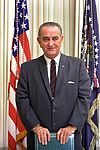Wilbur J. Cohen
Wilbur Cohen | |
|---|---|
Robert Finch | |
| United States Under Secretary of Health, Education, and Welfare | |
| In office June 1965 – May 1968 | |
| President | Lyndon B. Johnson |
| Preceded by | Ivan A. Nestingen |
| Succeeded by | James H. McCrocklin |
| Personal details | |
| Born | Wilbur Joseph Cohen June 10, 1913 Milwaukee, Wisconsin, U.S. |
| Died | May 17, 1987 (aged 73) Seoul, South Korea |
| Political party | Democratic |
| Spouse |
Eloise Bittel (m. 1938) |
| Children | 3 |
| Education | University of Wisconsin–Madison (BA) |
Wilbur Joseph Cohen (June 10, 1913 – May 17, 1987) was an American
Early life and career
Cohen was born in
After graduating from the University of Wisconsin–Madison in 1934, Cohen moved to Washington, D.C. where he was a research assistant for the committee which drafted the Social Security Act.
On April 8, 1938, Cohen married Eloise Bittel. They had three sons: Christopher, Bruce and Stuart.[1]
He was Director of the Bureau of Research and Statistics in charge of program development and legislative coordination with Congress for the Social Security Board (SSB), which was renamed the Social Security Administration in 1946.
Kennedy and Johnson administrations
In 1961, President John F. Kennedy appointed Cohen as Assistant Secretary for Legislation of Health, Education, and Welfare. According to Christy Ford Chapin (Insuring America's Health: The Public Creation of the Corporate Health Care System p. 205) it was Cohen who, during the writing of Medicare legislation, "advised fellow reformers that partnering with insurance companies would create a politically palatable program"—with the result that America is today the only "developed" country with a for-private-profit health care system and without universal health care. Cohen was responsible for developing many of the details of Medicare and Medicaid.[2]
Nicholas Lemann (The Promised Land: The Great Black Migration and How It Changed America p. 131 & 143) describes Cohen as "a first-generation New Deal social welfare planner [who] was deputy secretary but the real power in the Department of Health, Education and Welfare" and "an old friend of [Lyndon] Johnson." President Lyndon B. Johnson elevated him to Under Secretary in 1965, and he served as the U.S. Secretary of Health, Education, and Welfare from May 1968 to the end of Johnson's term, following the resignation of John W. Gardner. With a tenure of 249 days, Cohen became the shortest-ever secretary of that department, as the office was succeeded by the U.S. Secretary of Health and Human Services in 1980.
Later life and death
In 1969, Cohen retired at the end of a Johnson's administration. In 1970, Cohen served as the president of the American Public Welfare Association (renamed the American Public Human Services Association in 1997). In 1971, Cohen was elected to the Common Cause National Governing Board. In 1980 Cohen became a Professor of Public Affairs at the University of Texas at Austin.[3]
The
He died while attending a gerontology conference in Seoul, South Korea, on May 17, 1987. He is interred at Garden of the Memories Cemetery in Kerrville, Texas.
-
Cohen in the early days of Social Security with Maurine Mulliner, who was the executive secretary of the Social Security Board in 1935.
-
Cohen being sworn in as the Secretary of Health, Education and Welfare; from left to right: PresidentHubert H. Humphrey(far left), and the Eloise B. Cohen (right) and the three sons in 1968.
-
President Johnson signs a bill authorizing education programs for children with disabilities; from left to right:Albert H. Quie, Winston L. Prouty, Cohen (1968)
-
The Wilbur J. Cohen Building at the current US Department of Health and Human Services in Washington, D.C.
Books
- The Elimination of Poverty in the United States. Wilbur J. Cohen, 1963.
- The Roosevelt New Deal: A Program Assessment Fifty Years After. Wilbur J. Cohen. ISBN 978-0-89940-416-5.
- Social Security: Universal or Selective? Wilbur J. Cohen and Milton Friedman, co-authors. Washington: American Enterprise Institute for Public Policy Research. 1972. [1]
- Unemployment Insurance in the United States: The First Half Century. Saul J. Blaustein, Wilbur J. Cohen, William Haber, co-authors. ISBN 978-0-88099-136-0.
Biography
- Wilbur J. Cohen: the pursuit of power; a bureaucratic biography. Marjorie O'Connell Shearon. Shearon Legislative Service. 1967.
- Mr. Social Security: The Life of Wilbur J. Cohen. Edward D. Berkowitz.ISBN 978-0-7006-0707-5.
References
- ^ Fitzhugh Mullan (5 October 1988). "Interview with Dr. Philip Randolph Lee". History of Health Services Research Project, National Institutes of Health.
- PMID 10311372.
- ^ Saxon, W. Wilbur Cohen, Leading Architect Of Social Legislation, Dies at 73. New York Times May 19, 1987. p. D30.
- Joseph A. Califano (1995). "Mr. Social Security: The Life of Wilbur J. Cohen". University Press of Kansas. Archived from the originalon 2008-05-09.
- Social Security Administration profile
- Guide To Social Security Archives, Papers of Wilbur Cohen
- Kansas Press book on him
- Site on LBJ's cabinet
- Literacy Connections list of publications by Wilbur J. Cohen





